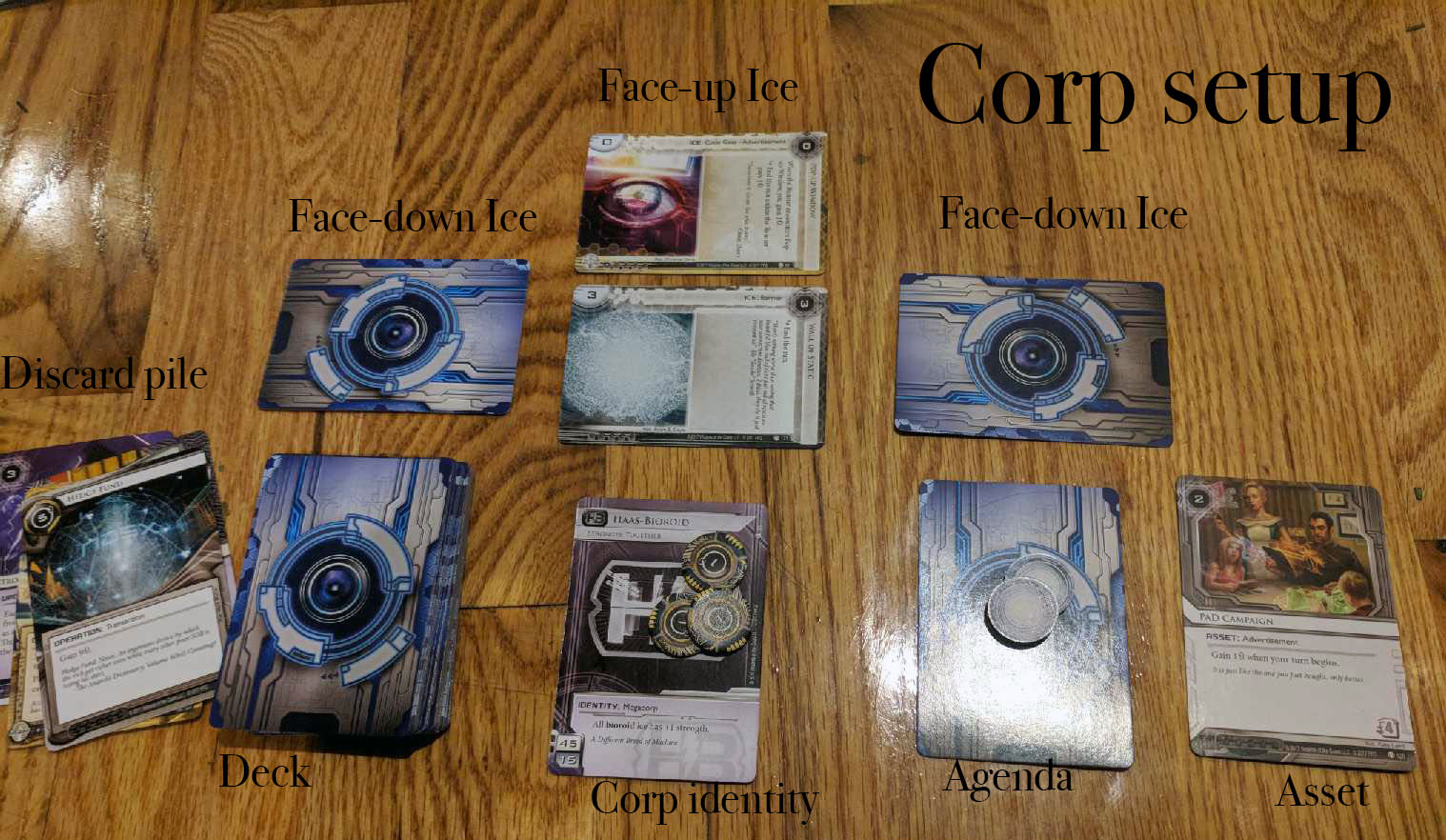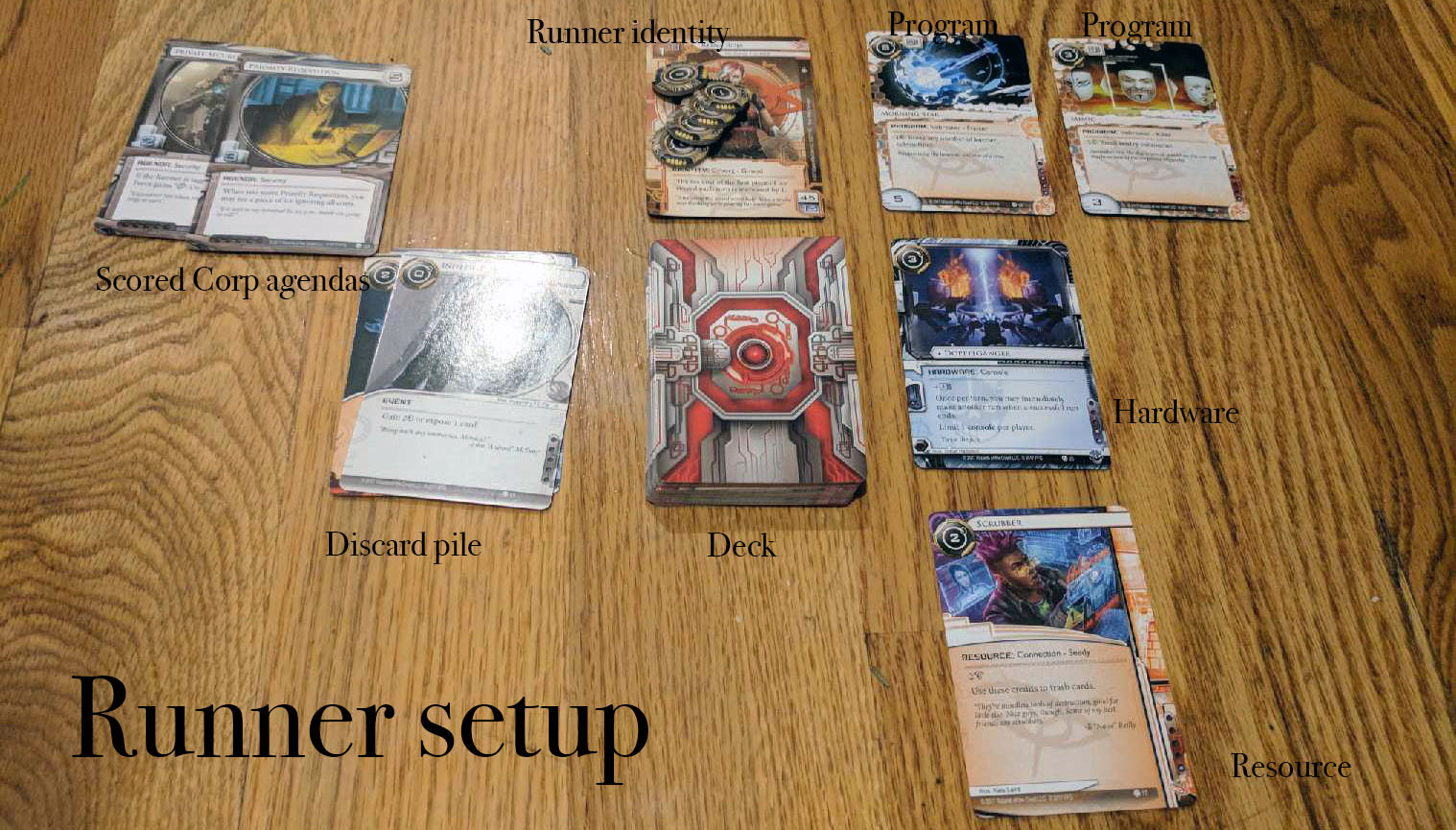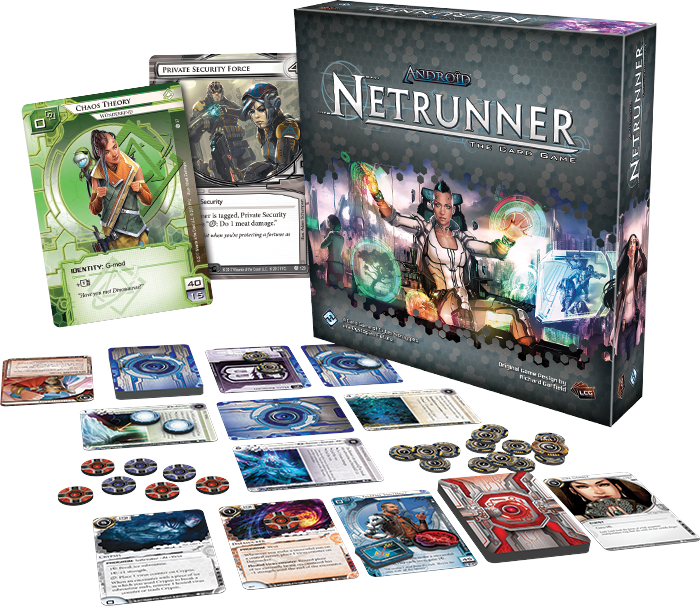The card game Android: Netrunner does not feel like a game. Jacked into its system, Android: Netrunner‘s thorny mechanics melt away until all that’s left are electric impulses in my brain interfacing with my opponents’. It becomes a stylish dance of psychology.
Android: Netrunner. Art by Adam Schumpert. Credit: Fantasy Flight Games.
Android: Netrunner is not a new card game, but it’s the most captivating one I have ever played. Released in 1996 as Netrunner, republished by Fantasy Flight in 2012 as Android: Netrunner, and updated with a revised core set December 2017, it’s the three-dimensional chess of card games. In 2018 when an easy-entry money-grabbing virtual card game such as Blizzard’s Hearthstone dominates the market, Android: Netrunner, solidly on the opposite end of the accessibility (and financial) spectrum, offers a real-deal experience of psychic puzzles and logical grit.
Instead of facing each other as equals, Android: Netrunner players take on the distinct roles of the Corp, or Corporation, and the Runner, or hacker. The premise is that a mega-corporation – perhaps a biotech conglomerate or a media supercompany – is maintaining secret agendas somewhere in cyberspace. The scrappy and resourceful Runner must hack the Corp’s servers and steal its data with limited time and resources. The Runner wins if she steals seven points worth of agenda cards. The Corp wins if she manages to advance seven points worth of agendas without the runner stealing them first.
It sounds like the premise of a William Gibson novel, but what makes Android: Netrunner a more powerful piece of cyberpunk media is how effectively it draws the players into its world and psychology.

The Android: Netrunner card Ash 2X3ZB9CY. Art by Mauricio Herrera. Credit: Fantasy Flight Games.
Players hold a maximum of five cards in their hands. On the table are cards they’re using to either hack their opponent or protect their resources. The Runner must aggress against her enemy to find and steal agendas, and the Corp must effectively protect those agendas from being discovered while, at the same time, advancing them out in the open. By the end of the game, the runner’s arsenal of hacking tools will be robust while the Corp’s defences will prove beguiling and stalwart. In the spirit of Gibson, Android: Netrunner never misses an opportunity to give a simple thing a grand cyberpunk name. A player’s hand is their “grip”. Currency is “credits”. Playing a card is “installing” it. Flipping one over is “rezzing”. Each side has several actions they can do per turn, including playing cards they’re holding.
In a typical Netrunner game, the Corp’s deck includes game-winning agendas; Ice, which is meant to protect agendas; and operations and assets, which support the Corporation’s agenda-protection with traps and attacks that neutralise hacks. Some of those, such as the cleverly-named Hedge Fund, will allow the Corp to trade in five monetary credits for nine. There’s also City Surveillance, which forces the Runner to take a tag that lets the Corporation exploit them in a number of ways – unless they pay a fee. Android: Netrunner has four corporations to choose from, each with unique player identities and unique abilities.
The Runner’s deck contains an arsenal of Ice-breakers, which let Runners break through Corps’ Ice; programs that mine credits or undermine the Corps’ servers; hardware that gives the Runner extra hacking tools; resources, powerful ongoing effects that Corps can heartlessly trash; and events, one-time actions that can be any variety of things.
Running in Android: Netrunner is a desperate, risky and psychologically taxing bid for a reward that the Corp is keeping hidden under moving cups. The mentality of playing as a capitalist cyberpunk conglomerate is evil, something that’s always fun to simulate in games.
Here’s how a typical spread of cards looks mid-game:

The author’s simulation of an Android: Netrunner Corp setup.

The author’s simulation of an Android: Netrunner Runner setup.
Netrunner‘s mechanics are very complex. It isn’t an easy game to learn, running against trends in accessibility set by Magic: The Gathering (whose creator also made Netrunner) and epitomised by Blizzard’s Hearthstone. After a year of playing, I still stumble over the game’s idiosyncrasies. Both players have a limited number of actions they can take per turn, which creates a dizzying number of potential play options. Adding a layer of complexity are the trickery and bluffs players weaponise as strategies. The Corp can hide traps instead of agendas behind Ice; the Runner can power through one of the unprotected Corp’s servers, and then sneakily let themselves in the back door of another, more profitable one. Android: Netrunner‘s learning curve is treacherous, but overcoming it is rewarding.
Android: Netrunner‘s voice as a game is cynical, jeering and witty. It suits the genre of “low life and high tech“. That voice is clear in all of its cards and the interactions built off them. The Runner’s Forged Activation Orders card forces the Corp to either flip over Ice or trash it, a tight and well-conveyed concept for a card. When the Corp scores the Hostile Takeover agenda, they receive a good sum of money, but take one “bad publicity” token, a mechanic that gives the Runner extra money when they hack the Corp – also a tight concept.

Credit: Fantasy Flight Games
Like any card game, Android: Netrunner games are won with many-layered strategies, thought-out card combos and swift-footed defensive maneuvers. Also like any card game, Runners’ strategies rely on how much risk they want to shoulder before making a big move. Unlike other card games, Android: Netrunner gives one player, the Corp, the opportunity to win with trickery and deception, as with the aforementioned misdirection of hiding behind Ice. It’s often costly and time-sucking for runners to hack through Ice cards to get to agendas. So it’s common for a Runner to commit themselves to a costly hacking “run” only to waste precious resources and get burned by a Poker-faced opponent. Moments like this have pushed me to the brink of tears. Those high-stakes gambles are why losing a game of Android: Netrunner‘s is so devastating and why winning is bliss.
Another special feature of Android: Netrunner is that it isn’t pay-to-win, at least not entirely. It’s a living card game, not a collectable card game. Android: Netrunner relies on a stable core set of cards, which was refreshed in late 2017. Several good decks are possible straight out of the box. Players can buy expansion packs, also containing specific, known cards. They can also purchase World Championship decks, or pre-made decks that pros constructed. More card variety can make for less predictable decks, but bleeding cash to stay competitive is not an imperative here. It’s a confident assertion that mindpower is what most effectively wins Android: Netrunner games.

Comments
4 responses to “Android: Netrunner: The Kotaku Review”
Great write up. I’m very keen to try. Also, thanks, I now feel like reading Neuromancer for, no kidding, somewhere between the 10th and 15th time.
No mention of the price… I’d heard this game can get expensive
Base game looks to be about $60 from a quick Google.
I’ve been playing this game for 5 years now; can’t get enough 😀
So well timed – I picked this up last week and spent all Saturday learning the ropes. Its fantastic fun, me and a friend melted 7 or 8 hours into it (including learning the rules from nothing) and head a great time. It does truly become a battle of wits. Icing up a decoy server that contains a trap is just amazing. We played with one person focusing on Corp mechanics and one on Runner and will swap next week, cant recommend it enough. Best part is you only REALLY need the core set – expansions add to the fun but aren’t necessary.